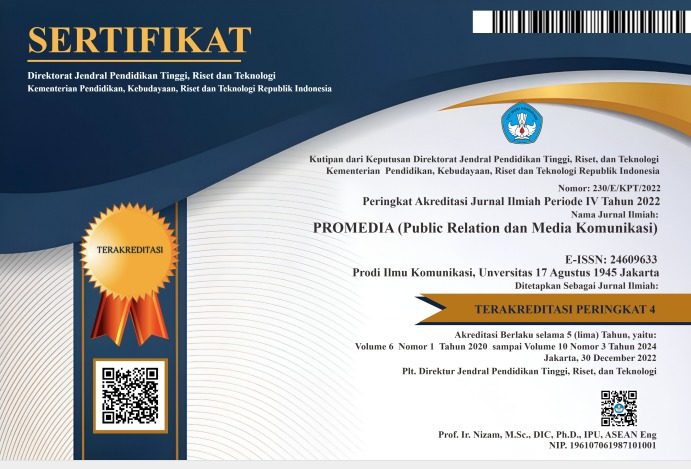Persepsi Konsumen Tentang Kampanye Brand Boycott Pro-Israel dan Preferensi Pembelian Produk Lokal di Kabupaten Banyumas
Abstract
The situation of the Israeli-Palestinian conflict, which is massively informed on various media platforms, encourages the world community to respond with various forms of support. One response that has emerged is a boycott campaign against products or brands that are considered affiliated with Israel. The “Bela Palestina” rallies held several times by community groups reflect the high level of empathy for the Palestinian people. This study focuses on the perceptions of consumers, especially Generation Z in Banyumas Regency, towards their purchasing preferences for local products in response to the boycott campaign. Through a qualitative approach, this research involved 7 informants from Gen Z. The results showed that all informants were very aware of the boycott campaign. The results show that all informants are very aware of global socio-political conditions and tend to choose brands that are considered to have concern for humanitarian and sustainability issues. Their commitment to religious and social values greatly influenced their decision to participate in the boycott campaign, which shows that global issues can influence consumer behavior at the local level, including in their preferences for purchasing MSME products.
Keywords: brand boycott, consumer behavior, generation Z, local products
Abstraksi
Situasi konflik Israel-Palestina yang diinformasikan secara masif di berbagai platform media, mendorong masyarakat dunia untuk merespons dengan berbagai bentuk dukungan. Salah satu respons yang mengemuka adalah kampanye boikot terhadap produk atau merek yang dianggap berafiliasi dengan Israel. Aksi “Bela Palestina” yang beberapa kali digelar oleh kelompok masyarakat mencerminkan tingginya empati terhadap rakyat Palestina. Penelitian ini berfokus pada persepsi konsumen, khususnya Generasi Z di Kabupaten Banyumas, terhadap preferensi pembelian produk lokal atas kampanye boikot tersebut. Melalui pendekatan kualitatif, penelitian ini melibatkan 7 informan dari kalangan Gen Z. Hasil penelitian menunjukkan bahwa seluruh informan sangat sadar akan kondisi sosial politik global dan cenderung memilih merek yang dianggap memiliki kepedulian akan isu kemanusiaan dan keberlanjutan. Komitmen mereka terhadap nilai-nilai keagamaan dan sosial sangat memengaruhi keputusan untuk berpartisipasi dalam kampanye boikot, yang menunjukkan bahwa isu global dapat memengaruhi perilaku konsumen di tingkat lokal, termasuk dalam preferensi mereka terhadap pembelian produk UMKM.
Kata Kunci: brand boycott, perilaku konsumen, generasi Z, produk local
Full Text:
PDF (Bahasa Indonesia)References
Afiyanti, Y. (2008). Focus Group Discussion (Diskusi Kelompok Terfokus) sebagai Metode Pengumpulan Data Penelitian Kualitatif. Jurnal Keperawatan Indonesia, 12(1), 58–62.
Alalwan, Ali Abdallah, Rana, Nripendra P, Dwivedi ,Yogesh K, Algharabat, Raed. 2017. Social media in marketing: A review and analysis of the existing literature. Journal Informatics and Telematics Vo.34 1177–1190
Bennett, S. 2013. 45 amazing social media facts, figures & statistics. Retrieved from http://www.mediabistro.com/alltwitter/45-socialmedia-stats_b49582.
Engel, J.F, Warshaw, M.R, Kinnear, T.C. dalam Blythe, Jim. 2006. Essential of Marketing Communication. Prentice Hall. London.
Erkan, I, Evans, C. 2016. The influence of social media on consumer purchase intention : an extended approach to information adoption. Computer and Human Behavior 61 47-55
Hamilton, M, Kaltcheva, V.D, Rohm, A.J. 2016. Social media and value creation : the role of interaction satisfaction and interaction immersion. Journal of Interactive marketing 36 121-133
Harmeling, C. M., Moffett, J. W., Arnold, M. J., & Carlson, B. D.2017. Toward a theory of customer engagement marketing. Journal of the Academy of Marketing Science, 45(3), 312–335
Helianthusonfri, Jefferly. 2018. Tools For Social Media Marketing. Elex Media Komputindo. Jakarta.
Kaufman, Barbara.2003, Stories that sell, stories that tell, Journal of Business Strategy, Vol. 24 Iss 2 pp. 11 – 15.
Keller, K.L. 2009. Building a strong brands in modern marketing communication environment. Journal of Marketing Communication 15 139-155.
Kevin Filo, Daniel Lock, Adam Karg. 2015. Sport and Social Media Research: Review. Sport Management Review Vo.18 166-181.
Kotler, Philip, Kartajaya, Hermawan, Setiawan, Iwan. 2017. Marketing 4.0 Bergerak Dari Tradisional ke Digital. Gramedia. Jakarta.
Leeflang, Peter S.H, Verhoef, Peter C, Dalstrom, Peter, Freundt, Tjark, 2014. Challenges and solutions for marketing in a digital era. European Managemant Journal 32 (1) 1-12.
Murdough, C. 2009. Social media measurement : it’s not impossible. Journal of Interactive Advertising 10 94-99.
Neuman, W. Lawrence. 2014. Social Research Method: Qualitative and Quantitative Aproaches 7th Edition. Essex: Pearson.
Rafid Sugandi, & Riri Anggraini. (2024). Gerakan Sosial: Aksi Bela Palestina Boikot Produk Israel Di Kota Padang 2017-2023. CENDEKIA: Jurnal Ilmu Sosial, Bahasa Dan Pendidikan, 4(2), 01–17. https://doi.org/10.55606/cendikia.v4i2.2482
Salam, K. N., Singkeruang, A. W. T. F., Husni, M. F., Baharuddin, B., & A.R, D. P. (2024). Gen-Z Marketing Strategies: Understanding Consumer Preferences and Building Sustainable Relationships. Golden Ratio of Mapping Idea and Literature Format, 4(1), 53–77. https://doi.org/10.52970/grmilf.v4i1.351
Salma, A., Rabbaniah, N., Nuh, A., & Wibowo, F. E. (2024). THE IMPACT OF THE BOYCOTT PHENOMENON ON SWITCHING INTENTIONS FROM FOREIGN FASTFOOD CHAINS TO LOCAL OUTLETS. Kinerja, 6(02), 194–208. https://doi.org/10.34005/kinerja.v6i02.3738
Setyawan, B. (2023, November 24). Peduli Palestina, Ribuan Umat Islam di Banyumas Gelar Aksi Damai. Https://Banyumas.Suaramerdeka.Com/Banyumas/0910975808/Peduli-Palestina-Ribuan-Umat-Islam-Di-Banyumas-Gelar-Aksi-Damai?Form=MG0AV3.
Suwatno. Komunikasi Pemasaran Kontekstual. 2017. Simbiosa. Bandung.
Patton, Michael Quinn.2001. Qualitative Research and Evaluation Methods 3rd. London: Sage Publication.
Morgan Thomas, A., Dessart, L., Veloutsou, C.2020. e journal of business research
Saxena, A Khanna U. 2013. Advertising on social network sites : a structural equation model approach. Vision 17 (1) 17-25
Schultz, V.E, Peltier, J. 2013. Social media slippery slope : challenges, opportunities, and future research direction. J.Res interactive market 7 (2) 86-99
Okazaki, Shintaro, Taylor, Charles R, 2013. Social media and international advertising: theoretical challenges and future directions. International Marketing Review 30 (1) 56- 71
Zeng, Benxian, Gerritsen, Roulf. 2014. What do we know about social media in tourism : A Review. Tourism Management Prespective 10 27-36
Zhu, Y.Q, Chen, H.G. 2015. Social media and human need satisfaction and implication for social media marketing. Bussiness Horizon 58 (3) 335-345
Zhu, Z, Wang, J, Wang, X, Wan, X. 2016. Exploring factors of users peer- influence behavior in social media purchase intention : evidence from QQ. Computer and Human Behavior 63 980-987.
DOI: https://doi.org/10.52447/promedia.v10i2.7820
Refbacks
- There are currently no refbacks.
 |  |  |  |
 |  |  |  |
 |  |  |


